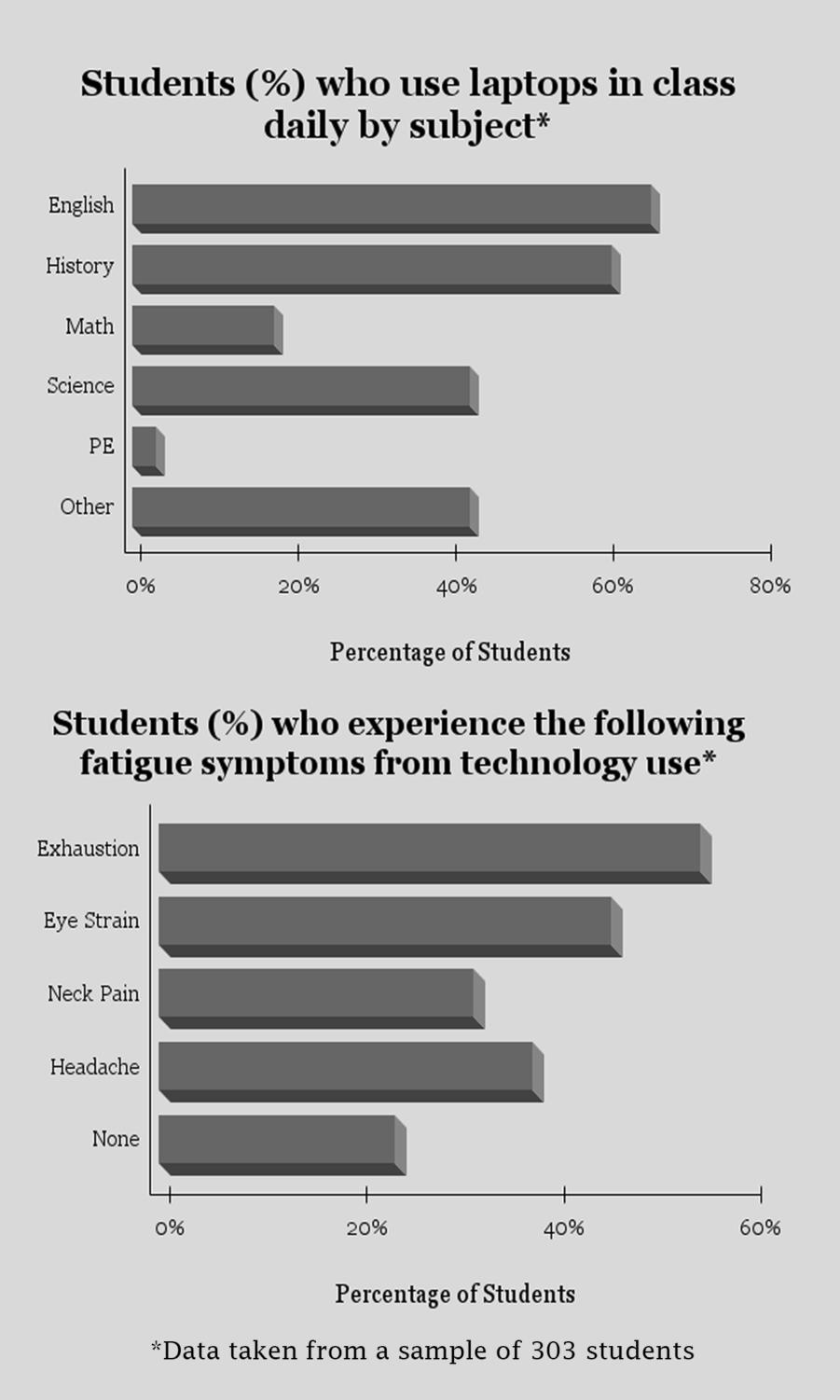Students adapt to increased use of technology in classrooms
October 29, 2021
Throughout her freshman and sophomore year, Kaili Contreras (12) would tote her JanSport backpack full of notebooks, a binder, and a sparkly pink pencil pouch to each of her classes. Now as a senior, her backpack bears only the weight of her laptop, and the noticeably lighter load that she carries to class serves as a constant reminder of everything that’s changed since the start of the pandemic.
According to Contreras, she felt excited when returning to the in-person schooling environment she had grown accustomed to prior to the pandemic. However, she says she was disappointed to find that the widespread use of computers for classwork had carried over from last year’s virtual learning into this school year.
“Now in school, it feels like we use our laptops in my classes to do practically everything,” Contreras said. “Everyone brings their own personal devices to school versus before the pandemic, we just borrowed Chromebooks from the school every now and then when it was necessary for our assignments. It’s definitely different than it used to be and we’ve had to adapt. I feel like it’s really been speeding up our use of technology as a whole.”
Similarly, Mihiret Derecki (12) says that since returning to campus, the majority of her in-class work has required the use of a computer.
“I feel like in my experience, we use technology in my classes a lot more than is necessary,” Derecki said. “I think there are definitely assignments where using computers is more beneficial and efficient but I feel like now just doing virtual work has become the default. There’s so many assignments that I’ve done that I think would be better suited to do on paper or in a way that we can actually engage in a class discussion face to face.”
Instead of participating in class discussions like they often did in their previous years on campus, both Contreras and Derecki now spend most of their class time on laptops reading online texts, creating infographics, responding to discussion boards, or filling out graphic organizers on Google Docs. According to Contreras, she feels as though this widespread use of computers creates a virtual wall that isolates her from her classmates.
“I feel like because a lot of our assignments are computer-based, we’re forced to do our work individually rather than collectively,” Contreras said. “It feels like it’s basically the same as being completely online as we were last year.”
In addition to feeling isolated from her peers, Contreras finds that she has a more difficult time processing information displayed on a computer screen as opposed to a piece of paper. As virtual work doesn’t typically align with her learning style, Contreras says that she finds herself feeling less motivated to complete her assignments.
“In some ways, only doing virtual work has really lessened my want to do the work in the first place,” Contreras said. “I think staring at a computer all day at school really has an affect on my mental health because it contributes to an overall decrease in my social and motivation levels, especially considering that I already spend so much time in front of screens outside of school. It just feels like it never ends.”
Similar to Contreras’ experience, Derecki said she finds it harder to digest information from a computer screen. According to Derecki, her learning disability makes it more difficult for her to complete her tasks efficiently when working from a computer.
“My learning disability makes it harder for me to process what I’m reading and writing down, and I feel like ever since virtual work has become the default in school, it’s become harder for me to get my work done before the end of each period,” Derecki said. “Especially when answering questions, I feel like when I actually write something out by hand, I’m making sure that my responses actually make sense. But when I’m typing something out, I find that I’m naturally less careful of that. So in that sense, I feel like the quality of my work isn’t necessarily what it used to be.”
Despite these difficulties, Derecki also recognizes how completing most of her school work online has helped her maintain a greater level of organization.
“In terms of keeping track of my assignments, doing computer work has benefited me,” Derecki said. “I’ve always had trouble staying organized, but I’ve found that it hasn’t been as much of an issue for me this year since all of my assignments automatically save in my Google Drive, and I don’t have to worry about keeping track of any papers.”
 For Valeria Suarez (12), most of the time she spends working at her laptop during the day is dedicated towards completing assignments for her AVID senior seminar class. While in past years, her AVID work mainly consisted of note-taking and paper assignments, Suarez said the workload in the class this year has become almost exclusively virtual. According to Suarez, she suspects that this increased use of technology has started to negatively affect her energy levels and sleeping habits.
For Valeria Suarez (12), most of the time she spends working at her laptop during the day is dedicated towards completing assignments for her AVID senior seminar class. While in past years, her AVID work mainly consisted of note-taking and paper assignments, Suarez said the workload in the class this year has become almost exclusively virtual. According to Suarez, she suspects that this increased use of technology has started to negatively affect her energy levels and sleeping habits.
“Although I understand that AVID senior year is centered around college applications and I do think that using our computers for this is beneficial in the sense that it’s more convenient, it tends to drain me out,” Suarez said. “Before this year and even Zoom school last year, I had always maintained a pretty healthy sleep schedule. But now I have a lot more trouble getting to sleep, and I think that has to do with the amount of time I spend glued to my laptop screen for AVID and for college apps.”
Similarly, Contreras says that the time she spends in front her laptop screen at school has had adverse effects on her physical health, specifically in how it perpetuates her chronic migraine condition.
“I need to wear glasses to do my work most of the time, but I’m not really supposed to wear glasses when looking at the computer screen, so when I have to take them off to do my computer work I’m constantly straining my eyes,” Contreras said. “This can really trigger a migraine for me or if I’m already dealing with one, straining my eyes a lot will just make it ten times worse.”
Though she’s still grateful to be back on campus after more than a year in distance learning, Contreras says that she worries how the increased usage of laptops in the classroom will accelerate students’ dependence on technology, and what unforeseen consequences could transpire as a result.
“Everyone knows it’s bad to spend so much time on our phones, and when we spend the whole school day in front of a computer screen, it’s not much different,” Contreras said. “It’s still screen time, and it’s going to have an impact on us in ways that we don’t immediately realize.”


